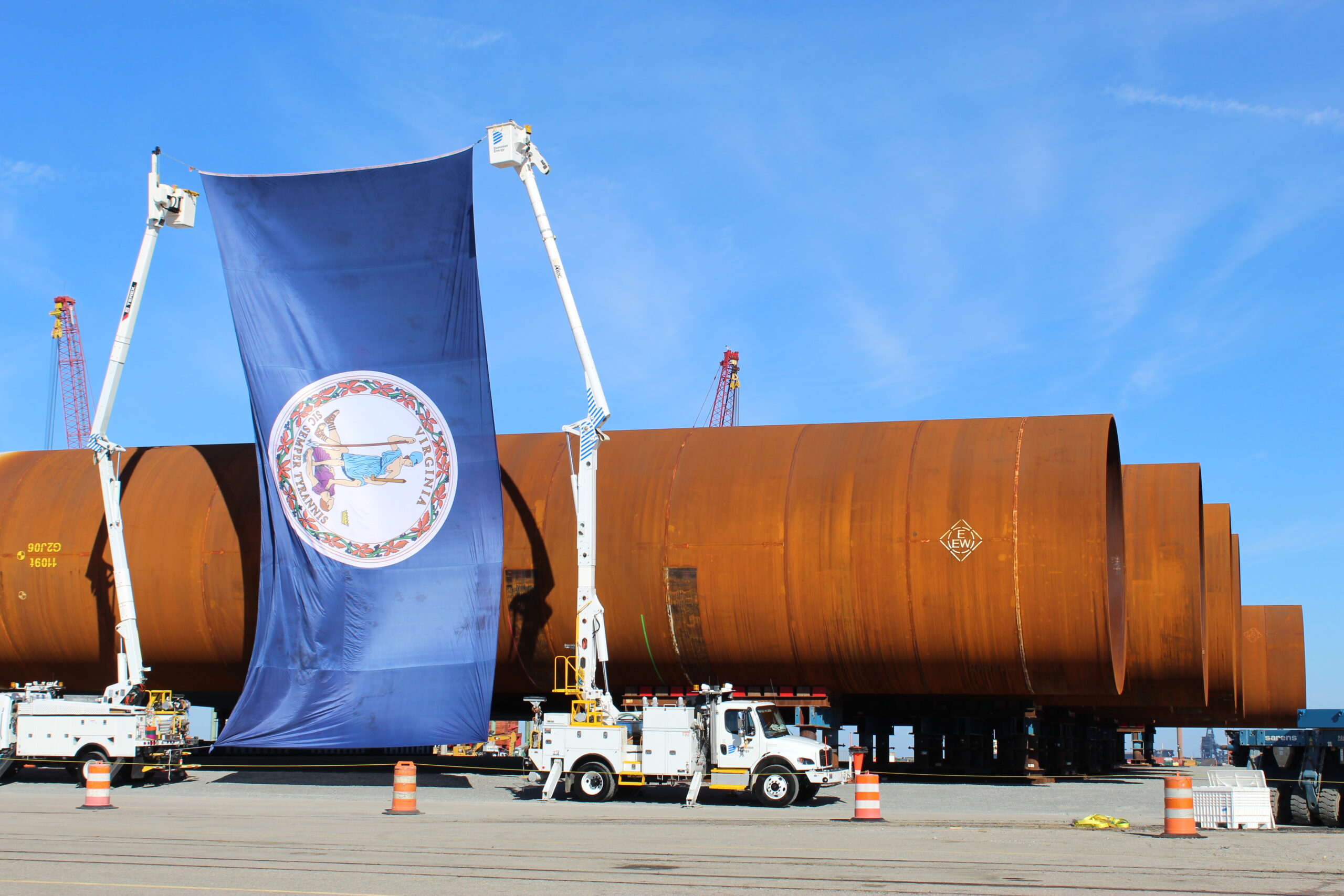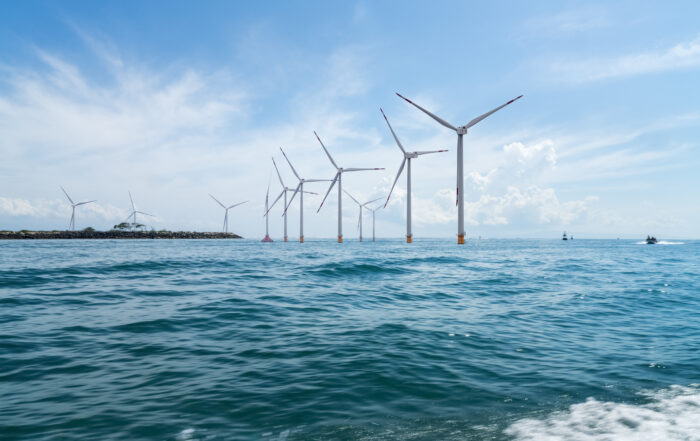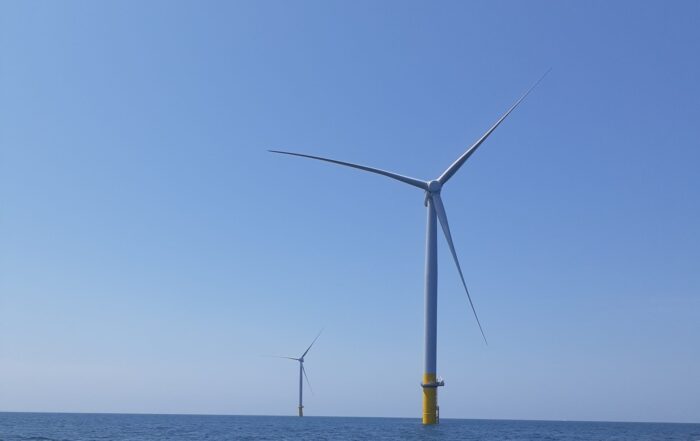Opinion: Developing offshore wind in Virginia takes time. That’s a good thing.
In a joint Opinion-Editorial, Virginia Conservation Network’s Clean Energy & Climate Justice Policy Manager, Lillian Anderson, and Sierra Club Virginia Chapter’s Offshore Energy Program Director, Eileen Woll, celebrate the milestones that will start the construction of the largest offshore wind project in the country. See the Op-Ed in the The Virginian-Pilot, published on November 11th, 2023.


Wind turbine “monopile” foundations arrive in Virginia.
The Coastal Virginia Offshore Wind project just hit a major milestone: the Bureau of Ocean Energy Management (BOEM) issued its Record of Decision to approve the construction and operation of 176 wind turbines 23.5 miles off the coast of Virginia Beach. This kicks off the 90-day approval period of the construction plan, which we expect BOEM to approve on January 29th, 2024. Finally, Virginia will be able to begin the construction of the largest offshore wind project in the country!
If it feels like Virginia’s flagship offshore wind project development has been a long process, you’re right. The conservation community has been celebrating CVOW milestones since the Virginia Clean Economy Act passed in 2020, which guaranteed our massive offshore wind industry by law and Virginia’s transition to a zero-carbon electric grid by 2050. Last week, we celebrated the delivery of hulking, 1500-ton steel monopiles which will serve as the foundation for the wind turbines. We’ll continue to celebrate these milestones until 2026, when offshore wind energy will begin fueling over 660,000 homes with renewable energy.
The process is working.
The six-year CVOW project is a long development process, but that means the process is working. To protect ratepayers, wildlife, the workforce, and the environment, we must check every box:
Protecting our Natural Resources:
The size of this project, as with any build-out of large infrastructure, presents the possibility of unintended environmental consequences. Virginia Conservation Network submitted comments outlining our concern for wetlands, aquatic ecosystems, and the potential increase in air pollution from construction. The State Corporation Commission worked with environmental organizations to ensure environmental best practices will be followed throughout the development of CVOW.
Protecting the Workforce
CVOW will provide tremendous job and wealth-building opportunities statewide. Sierra Club Virginia Chapter entered into a settlement agreement with Dominion Energy for their Economic Development Plan for the project. The settlement will improve diversity, equity, and inclusive hiring practices for jobs related to the offshore wind project.
Protecting Wildlife
Extensive survey work — more than two dozen studies and surveys — has been conducted to provide baseline information that is essential to protecting wildlife. Scientists at the National Oceanic and Atmospheric Administration actively worked with BOEM and other stakeholders to reduce the risk to whales and other marine species. Opponents of offshore wind, led by the oil and gas industry, tend to blame offshore wind for whale mortality while ignoring proven causes of whale mortality. The leading causes of mortality for many large whale species is vessel strikes and fishing gear entanglements, and marine mammal health will continue to be threatened by changes in the ocean environment brought on by climate change. Offshore wind energy will reduce Virginia’s reliance on fossil fuels, decreasing greenhouse gas pollution that contributes to climate change.
It’s a long process, but it’s worth it.
This massive source of clean, renewable energy will take us leaps and bounds forward in the fight against climate change. Displacing 2.7 gigawatts of fossil fuel energy will mean less carbon dioxide in our atmosphere, reduced need for fossil fuel infrastructure such as pipelines, and reduced amounts of fossil fuels and byproducts which could leak into our water sources.
But offshore wind energy is not just about clean energy; it’s a vital driver of economic development, contributing to the US economy’s growth and technological innovation. Virginia’s economy will benefit from offshore wind energy:
- 1,000 high-paying permanent jobs for Virginians in the advanced energy industry
- 900 high-skilled, high-pay manufacturing jobs for those without a college degree
- $210 million in new economic output
- $6 million in revenues for local governments
- $5 million in Virginia state tax revenues
The transition to 100% clean energy by 2050 might feel like a long journey, but the destination is a livable, prosperous future. We’d say that’s well worth it.
###
ROUNDUP: Virginia Conservation Network Celebrates Next Step for Offshore Wind Energy
The Coastal Virginia Offshore Wind (CVOW) project has taken the next step towards completion! The Bureau of Ocean Energy Management (BOEM) issued its Record of Decision, which kicks off the 90-day approval period of the Construction and Operations Plan (COP).
OPINION: “All of the Above,” but not all-in on offshore wind
Virginians cannot afford to put today’s clean energy solutions on hold. In an Op-Ed, VCN explains why we need to be all-in on offshore wind energy to cut household energy costs, grow our economy, and create jobs.
ROUNDUP: Next Steps for the Coastal Virginia Offshore Wind Project
The State Corporation Commission approved a cost recovery application for the Coastal Virginia Offshore Wind project, bringing the massive project one step closer to the finish line.



